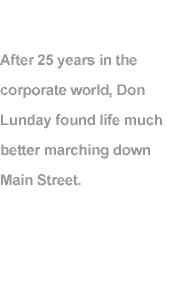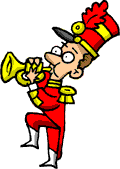 |
|
||||||||||||

|

|
|
By Tina Pamintuan
|
At the Christmas parade in Mexico City, the 60-foot snowman and Santa Claus balloons wouldn't fly, but Don Lunday, independent parade consultant, didn't panic. "It was a little concern," he says with the casual air of someone who's seen worse. There was, for example, the time a balloon escaped from its handlers during a Thanksgiving parade in Detroit and landed 30 miles away in Lake Erie. "The Coast Guard brought it in," he says with a chuckle. The Detroit incident didn't happen at one of his events, thankfully, but it's the kind of thing that can and does happen at parades, Don says -- the kind of disaster he's hired to prevent. Showdown at High Noon Known for his direct, professional style, Don handles big parades both in the U.S. and abroad. His consulting career began the day he left his job as a marketing and sales executive at a successful computer and printer supply company. At the time, it was an unusual and risky decision. IPs were still rare in 1974. So what made him forego the regular paycheck for uncharted territory? Was it the hours? The salary? The commute? Life in a cube? "No," Don says, "I just always wanted to be my own boss."
Don prefers to talk about the positive reason he decided to go into parade consulting. "[Parades] are just fun!" he says excitedly. Since his first paying job with Radio City Music Hall's Special Events Department (he produced a parade commemorating the 200th anniversary of the signing of the Constitution), he's known that his true calling is parade consulting. "There's nothing more satisfying than going down the street with Mickey Mouse as your grand marshal and knowing that every kid sitting on the curb is having the time of their life. There is a childlike quality to a parade," he says. "It's a wide-eyed experience." Parade Guy From his home just outside Denver, Don operates as HOBS Associates, handling between eight and ten events a year. Though he happily takes on the occasional community festival (his resume includes the Gilroy, Calif., Garlic Festival and, just last year, the nation's first tequila festival), he's known in the events planning business as a "parade guy." In fact, parades constitute 75 to 80 percent of his business. Whether he accepts a project or not depends on a number of variables, including how he feels about the client, the city, and the celebration. If he feels strongly about a celebration, he'll sometimes work for a smaller fee, as was the case with last year's Philippine Bicentennial Celebration Parade. "I probably did not get paid what I would have in this country for that kind of celebration." But who cares? The personal gratification made the effort worthwhile.
The Power of Positivity The "HOBS" in "HOBS Associates" stands for "Helping Others Be Successful," which Don does, in part, by motivating the other people who make the parade happen. "There's no way I can put on a parade without [volunteers]. I spend a lot of time either creating a volunteer base or taking a volunteer base already in existence and massaging it, exciting it, and motivating it," Don explains. "I build in them a confidence so they know they're ready for this." His talent for inspiring others also comes in handy for managing himself. His transition from executive to IP was challenging, especially at first. "It's [not easy] to sit down with yourself and look in the mirror and say 'Don, let's have a talk' or 'Excuse me, Don, this isn't working.' It's difficult to lecture yourself," he says. But what choice does an IP have? These heart-to-heart conversations with himself naturally dwindled as he gained experience and confidence. Though he sometimes turned to fellow freelancers for advice, Don insists that most of what he has learned was self-taught. "I've been doing this [since] long before it was fashionable," Don says of the boss-free life. "There just wasn't the network of independents that you see today." At Home... in the Office Don doesn't think self-employment is for everyone, but he's certainly made it work for himself. His day starts at four a.m. sharp. The first thing you might hear in Don's house isn't an alarm clock (he doesn't use one), but the padding of feet… and paws. "Big Kitty," Don's 14-year-old Siamese cat, shares his pre-dawn hours; seeing to her breakfast is Don's first business of the day. An hour of meditation (he belongs to the Mile High Church of Religious Science) before his own breakfast ensures that he's mentally fresh for the official Don's wife Jan, an accountant, handles all his bookkeeping. "I keep track of all my expenses and I turn in my expense account to her like I would to a boss," he says. "I don't know anything about taxes and I don't want to know anything about them." For IPs who aren't lucky enough to be married to a finance professional, Don offers this piece of advice: Hire one. If necessary, Don would probably make a fine bookkeeper himself. As his own secretary, he takes meticulous notes of every phone call he receives -- the date and time of the call, the gist of the conversation, and any follow-up plans. His office, located in a separate room in his home, boasts a filing system that would make a librarian proud. Only current "open" files are kept on his desk; all others he relegates to file cabinets. Parade Prep Though he likes to have a full 12 months to plan a big event, Don has whipped up parades for clients in as few as three months. Working with volunteers accounts for most of his time. He likes to give the float builders six months advance notice. Also, he advises clients that if they want the pick of the litter, it's best to reserve balloons as early as possible, since inflatables are usually rented and not built to order.
Intensive preparation is important because the event only happens once. There are no dress rehearsals. Don says the adrenaline rush he gets before the step-off of each parade is one of his favorite things about his work. "It's just blood-curdling at times. You're there and you're looking at the 4th of July and it's 98 degrees and a hundred percent humidity in Atlanta and you say, 'Oh man, is this going to be a tough one.'" It comes as no surprise that his favorite moment in a parade is the "step-off," the moment when it all begins. Several months of detailed planning come down to this moment. The television crews are in place. The spectators stand pressed against rope barriers. All that's left to do is trust that the volunteers remember their instructions regarding typical parade emergencies -- like what to do if the homecoming queen's float overheats or if a horse mistakes the parade path for a porta-potty. Another thing Don loves about parade consulting: when it's over, it's over. "There's nothing deader than yesterday's parade," he says. Any attendant stress vanishes at celebration's end like confetti in the wind. The Dough Behind the Show Recently, Don returned from Greeley, Co., where he's planning next year's Fourth of July parade. It was one of his "on-site" days, which typically involves traveling to the city where the parade or festival will take place and working with volunteers and city officials to choose the parade route, audition bands, oversee float design, and discuss security issues. For this project, Don is helping city officials to identify potential corporate sponsors and entice them with perks such as grandstand seats or banner space on a float. Today, corporate sponsorship is the most common way to fund a parade, and the reason Don believes the American parade has a bright future. Sure, he's seen parades disappear due to lack of city funding, but over the years he's also seen the number of corporate sponsors grow tremendously. In the past, city governments, non-profit associations, and local department stores would usually foot the bill. Although cities and community non-profits are still the main organizers of parades (and the people who hire Don and pay his fees), corporate sponsors are the main contributors to the parade budget. Contacts
Visiting colleagues' events also serves other purposes: it's a way of showing support, and an opportunity to see what others are doing in the field. Unlike many industries, Don says, the parade business isn't cutthroat. Colleagues will sometimes exchange videos of their most recent events to show how a particular celebration was carried out. "No parade is in competition with another," Don says. "If you see something you like in Atlanta there's nothing to keep you from putting it in a parade in Boise." Wisdom Don likes to wax philosophical about parades and the social role they play. They exhibit homegrown pride, he says, the kind of pride that often gets lost in a business-oriented culture. It's exactly this local flavor that a parade consultant tries to evoke in the celebration. When asked whether you'd be able to tell a parade he's produced from someone else's by watching curbside, Don seems horrified and says emphatically, "You'd better not! It's all about helping communities come together to define their uniqueness." The last thing Don wants is for somebody to say, "Oh, this must be a Don Lunday parade." Still, what these parades have in common is Don Lunday, watching quietly in the background, a smile of satisfaction on his face. If he ever "grows up," Jan Lunday says, her husband will have to get a new job. However, there's no sign of a career change anytime soon. "As long as I can walk a parade I'll be working on them," Don says. "And if I can't walk the route I just may get in a golf cart and ride along beside it." |
|||||||||||||
|
April 10, 2000 Primary Editor: Eric Gershon Illustrator: James Stringer Production: Fletcher Moore |
We'd love to hear your comments about this article! Tina Pamintuan is a freelance writer and radio producer in Washington, DC. If you like, we'd be happy to put you in touch with her, or with anyone named in this article. | |||||||||||||
|
| ||||||||||||||
 After leaving his employer, Don's first stint as an IP was in business consulting. Companies with sales and marketing problems would hire him to determine, for instance, the reason for low sales, or to evaluate a product's new ad campaign. After ten years he left this gig because of the stress. "Not good for the soul," he says in a tone that says he doesn't want to go into it.
After leaving his employer, Don's first stint as an IP was in business consulting. Companies with sales and marketing problems would hire him to determine, for instance, the reason for low sales, or to evaluate a product's new ad campaign. After ten years he left this gig because of the stress. "Not good for the soul," he says in a tone that says he doesn't want to go into it.
 Still, parade consultants can't live solely on warm and fuzzy feelings. So what kind of money would you have to shell out to hire one? Don prefers not to talk about money, but Peter Smith, formerly of the Parade Company in Detroit, Michigan, says that parade consultants are generally paid a project fee and not by the hour. To perform a single
Still, parade consultants can't live solely on warm and fuzzy feelings. So what kind of money would you have to shell out to hire one? Don prefers not to talk about money, but Peter Smith, formerly of the Parade Company in Detroit, Michigan, says that parade consultants are generally paid a project fee and not by the hour. To perform a single  The momentum of the planning picks up as the parade date approaches, and Don might log as many as 80 hours a week in the month leading up to the event. Although he never actually marches in a parade he produces ("No time," he explains), you might find him strolling the parade route on the day before the celebration -- looking for potholes, low hanging branches, overhead wires, and anything else that could pose a safety hazard.
The momentum of the planning picks up as the parade date approaches, and Don might log as many as 80 hours a week in the month leading up to the event. Although he never actually marches in a parade he produces ("No time," he explains), you might find him strolling the parade route on the day before the celebration -- looking for potholes, low hanging branches, overhead wires, and anything else that could pose a safety hazard.
 Like most businesses, special events planning thrives on networking. In fact, the word "Associates" in Don's business name refers to the many contacts he brings to a parade -- many of which he made while working as an unpaid parade volunteer before he went into the business himself. Currently, one main source of referrals for Don is the International Festivals and Events Association (IFEA), an organization that serves as a resource for individuals and organizations in the special events planning business. He also travels to colleagues' events as a way to keep his contacts fresh.
Like most businesses, special events planning thrives on networking. In fact, the word "Associates" in Don's business name refers to the many contacts he brings to a parade -- many of which he made while working as an unpaid parade volunteer before he went into the business himself. Currently, one main source of referrals for Don is the International Festivals and Events Association (IFEA), an organization that serves as a resource for individuals and organizations in the special events planning business. He also travels to colleagues' events as a way to keep his contacts fresh.